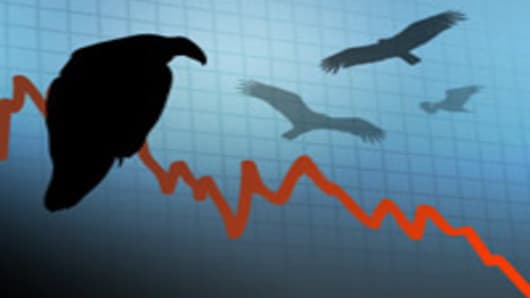U.S. third-quarter GDP data was "horrible" and investors will soon realize that it wasn't as good as they initially thought, Marc Faber, publisher of the Gloom, Doom and Boom Report, told CNBC.com.
"I wouldn’t rely on the GDP figures and I think the market will actually realize that they were quite poor," Faber said.
The figures, which pleased investors by beating analysts' consensus expectations Thursday, didn't give positive signs for personal income and unemployment, Faber pointed out.
U.S. gross domestic product grew at 3.5 percent on an annualized basis, showing that the economy was, at least unofficially, out of its longest recession since the great depression. But Faber told CNBC.com that the figures were not always reliable. "I wouldn't rely on GDP figures, you can manipulate them," he said.
Stocks rallied after the data and closed sharply higher across the board as investors welcomed the news.
"It's a very important piece of evidence that we are on the road to recovery," Chris Wyllie, head of portfolio management at Iveagh, told CNBC. "The fact that it beat expectations is obviously a positive… The fact that the consumer was stepping up to the plate was a big driver."
Other analysts were more pessimistic and thought the strong third-quarter figures would be as good as it gets for the U.S. economic recovery.
Avoiding Government Bonds
The Federal Reserve could be set to repeat its mistakes of the past by keeping interest rates at practically zero for a protracted period, according to Faber.
"The risk on interest rates is on the upside and it will surprise you how high they will be in 5 or 10 years time," Faber said.
Bernanke only ever targets core inflation, Faber pointed out. But that strategy misses the point and it was the main cause of the current crisis, he said.
"How many people in this room can live without food and energy?" he asked a packed conference hall at the World Money Show. "Maybe at the Federal Reserve," he added.
Faber does not recommend investing in government bonds and said the only condition where government bonds would be a good investment would be if there was further weakness in the economy. Even then government bonds wouldn't be a "happy place to invest," he added.
The Federal Reserve's policy of low interest rates has led to enormous economic volatility and to a "total mispricing of capital," Faber said referencing previous periods of low interest rates.
The "ballistic" surge in oil prices seen in 2007 and the first half of 2008 was caused partly by a lack of investment and rising demand from Asia, but it was aggravated by the Fed slashing interest rates, Faber said.
"Fed policy encouraged people to further speculate in commodities," he said.
The rising fuel prices also acted as a tax on people's income and aggravated the strains on U.S. consumption, he added.
Faber pointed out that there is currently a tug-of-war between the government and corporations and consumers. The government is pushing corporations and consumers to increase leverage, while they try to reduce borrowing in the wake of the financial crisis, he said.
"If you have a drunk and he is drunk, you try to solve his problem by giving him more … this is role of the government. In my opinion this worked very badly," he said.
Mugabe is Bernanke's Mentor
The economic boom period before the financial crisis was the only synchronized global boom in the history of capitalism, Faber pointed out. The only country in recession at that time was Zimbabwe, and that was because it was run by Robert Mugabe, Faber said.
Mugabe is the "mentor" of Bernanke, Faber said, causing an outburst of laughter from the conference.
Investors should have at least 50 percent of their money in emerging economies and should be accumulating Asian stocks, Faber said.
Faber also recommends buying only one U.S. Treasury bond and putting it in a frame on the wall. He said it will only be good for showing the grandchildren as it will become worthless.
Faber also suggests holding "some gold" and warns against trusting fund managers.


